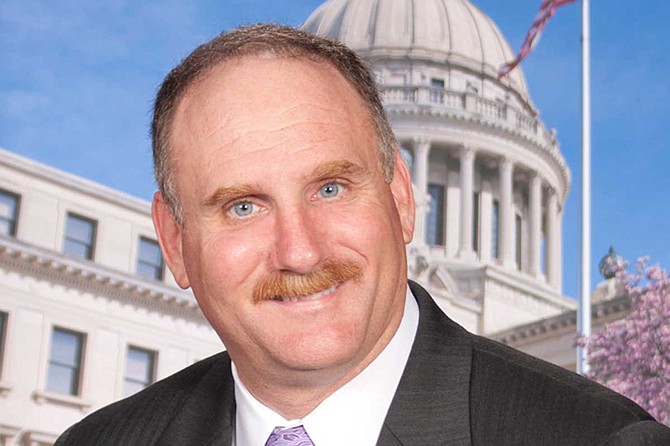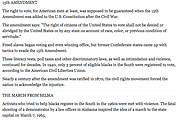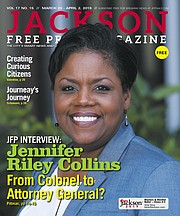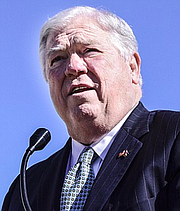At a campaign stop in Tupelo, Rep. Mark Baker, who is running for Mississippi attorney general, said the preclearance provision of the Voting Rights Act violated southern states' "sovereignty." Current Attorney General Jim Hood, Baker said, should have joined other red states that successfully petitioned the Supreme Court to strike down the VRA's preclearance requirements in 2013. Photo courtesy Mississippi House of Representatives
JACKSON — At a Tupelo campaign stop on Monday, Mississippi State Rep. Mark Baker, a Republican candidate for attorney general, said the 1965 Voting Rights Act violated Mississippi's "sovereignty."
Current Attorney General Jim Hood, Baker said, should have joined other red states that successfully petitioned the Supreme Court to strike down the VRA's preclearance requirements in 2013.
A Look at 48 Years of the Voting Rights Act
The voting law that became a major turning point in black Americans' struggle for equal rights and political power is now outdated, the Supreme Court says.
"With preclearance, Mississippi and a few other southern states were put in a group and (told), 'You cannot manage your own elections. Your sovereignty is of no value at the federal level,'" Baker, who represents Brandon in the state House, said. "Our attorney general decided that the federal government's thumb on our elections was important in this day and time."
Under preclearance, the U.S. Department of Justice had to approve any changes to voting laws in certain southern states like Mississippi. When it passed the act in 1965, Congress singled out those states because of their notorious history of denying African Americans the right to vote.
"We used to pass bills in the Legislature, and although they were law once the government signed them, they were not effective until some nameless, faceless, party apparatchik on the third floor of the Department of Justice signed off on it,” Baker said Monday.
The Daily Journal's Caleb Bedillion first reported Baker's comments on Thursday.
Hood, who is a Democratic candidate for governor, did not respond to a request for comment Friday afternoon.
'A Code Word for White Supremacy'
Stephanie Rolph, a Millsaps historian who focuses on the South's history of segregation and its opposition to civil rights, told the Jackson Free Press on Friday that Baker's comments hearkened back to the era she studies.
"The use of the word 'sovereignty' certainly would have been a code word for white supremacy in the 1950s or 1960s," she said. "State sovereignty and states' rights were phrases often used to mark resistance to civil-rights advancements in terms of federal legislation."
Preclearance was a necessary step to remedy southern defiance when it came to voting rights, she said.
"Many southern states had thrived in the isolation and the darkness that local officials could extend to registration offices, county-clerk offices and even polling places," Rolph said.
Jody Owens, who leads the Mississippi branch of the Southern Poverty Law Center, a prominent civil-rights group, pointed to the state's history of preventing African Americans from voting by using literacy tests, poll taxes and forcing them to do things like count jelly beans in a jar before they could exercise their right to vote.
"Mississippi's record on voting rights is horrible as it pertains to poll taxes, literacy tests and voter intimidation," said Owens, who is a 2019 candidate for Hinds County District Attorney. "To highlight, or ignore that the Voting Rights Act, and in particular, the fact that it was in direct response to states like Mississippi using intimidation and other tactics to suppress the vote, is wrong. And Mr. Baker should acknowledge that."
CofCC: The Group That Inspired Dylann Roof's Massacre
From Terrorists to Politicians, the Council of Conservative Citizens Has a Wide Reach
Rolph explained that segregationist groups like the Citizens Council would network with business contacts, civic groups and politicians they helped elect to quash access to the polls for black Mississippians.
The Citizens Council, which started in Greenwood, Miss., argued that federal laws like the VRA and the 1964 Civil Rights Act violated "state sovereignty."
"So certainly, the sovereignty issue is something that will ring the bell with a lot of people for whom it reminds ... of the 1950s or 1960s," Rolph said. "It's something that comes up when you hear that word used as sort of a way to code racist language."
Baker: Hood 'Should Not Have Sided With the Federal Government'
On Friday, though, Baker told the Jackson Free Press that he did not mean to suggest the VRA's preclearance provision was a bad thing when Congress adopted it in 1965. By the time the question was before the Supreme Court in 2013, though, Baker thought Hood should have supported the lawsuit against it.
"My comments were related to that recent occurrence, and with regard to that, my position was that the preclearance requirements should not have been extended," he said. "And I'm glad it was not. And our attorney general should not have sided with the federal government."
He declined to identify the point at which he thought preclearance was no longer needed.
In its 2013 decision in Shelby County v. Holder, the Supreme Court split along partisan lines 5-4, with Republican-appointed justices voting to strike down the preclearance provision and the Democratic-appointed justices voting to preserve it. In the majority opinion, conservative Chief Justice John Roberts wrote that preclearance violated the "equal sovereignty of the states" by singling states like Mississippi and Alabama out "based on 40 year-old facts having no logical relationship to the present day and thus (preclearance) is not responsive to current needs."
In a 2018 report, the Brennan Center for Justice "found that states previously covered by the preclearance requirement have engaged in recent, significant efforts to disenfranchise voters." Some of those states, the report also found, "have purged voters off their rolls at a significantly higher rate than non-covered jurisdictions."
Baker's Remark Not 'Born Into a 2019 Vacuum,' Roth Says
Even though Baker sought to distinguish between past opposition and his recent comments, his comments on "sovereignty" are inextricably linked to the past, Rolph said.
"In Mississippi, there's no way you can divorce those comments from our history of defiance, because the federal and state tension is largely tied to two major events: the Civil War and the Civil Rights Movement," the historian said. "And in both cases, remnants of that surfaced in very particular and powerful ways in the aftermath."
In the Reconstruction period after the Civil War, the federal government enforced voting rights and civil rights for freed slaves. During that period, Mississippi even elected two black U.S. senators, Hiram Revels and Blanche K. Bruce—a feat the state has failed to repeat in the modern era.
As the North loosened its grip, though, southern states implemented various means to obstruct civil rights and voting rights. They made it difficult for African Americans to find work and imprisoned many for vagrancy. Groups like the Ku Klux Klan in southern states also terrorized their black residents in other ways; in the time between the Civil War and the Civil Rights Movement, Mississippi lynched more African Americans than any state in the nation.
A similar backlash played out after President Lyndon Johnson, a Democrat, signed the Civil Rights Act and the Voting Rights Act, Rolph explained, with southern whites gravitating toward Alabama Gov. George Wallace's run for president as a segregationist Dixiecrat running against federal meddling in the south.
"After the Civil Rights Act, it comes in the form of this shift in support for George Wallace's campaign for president in 1968, and eventually into the party that welcomed segregationists," she said.
That strain of defiance first showed up with Wallace, Rolph said, but was then "absorbed by the Republican Party"—Baker's party.
‘Why Can’t I Break That Barrier?’: The JFP Interview with AG Hopeful Jennifer Riley Collins
During the JFP's afternoon interview with Jennifer Riley Collins in downtown Jackson, she explained what she believes she can bring to the attorney general's office.
From 1956 to 1977, Mississippi governors used the taxpayer-funded Sovereignty Commission to defend segregation and to collaborate with local law enforcement to spy and clamp down on civil-rights activists, even orchestrating firings and evictions to convince them to give up their activism. The spies also reported any activity by everyday white people seen as helping the goal of black freedom, down to a gas-station owner in Philadelphia, Miss., who allowed a black man to use his bathroom.
"As a historian, there is no way we could say that his statement is born into a 2019 vacuum that just comes out of nowhere," she said.
She said she still hears arguments about state sovereignty, sometimes in unexpected places.
"I was in an active-shooter training yesterday, and the homeland security employee who was giving the training began to sort of explain her position on the federal government staying out of people's behavior and not regulating people's behavior, so it's just ironic that you're calling me today," she said.
At one point, she said, the homeland security employee said she believed it was okay for law enforcement agencies to profile suspects based on their appearance, and specifically cited someone wearing a hoodie as an example.
"That fits a certain profile—a lot of us in the room were thinking Trayvon Martin," she said, referring to the 17-year-old unarmed black teen who was wearing a hoodie when George Zimmerman shot and killed Martin in 2012, later claiming that he feared for his life.
"She was saying that police and law enforcement do profile people, and she would be reluctant to ask the federal government to step in and interfere with state and local law enforcement profiling practices," Rolph said. "That idea of the federal government as an interfering, rather than an interventionist entity, is something we hear quite a lot of. I think it shows up in different places than it did in the 1960s, but it still rings people's bells."
On Friday, the Mississippi Senate passed a resolution calling for a constitutional convention to change the U.S. Constitution. One of the changes the resolution calls for would enshrine greater "state sovereignty" into the nation's governing document.
Baker Opposed Bills to Restore Voting Rights to Felons
Last month, legislators introduced several bills that would have restored voting rights to people who lost them after a felony conviction, but only upon completion of their sentences. Those bills, some of which were in House Judiciary B, where Baker is chairman, all died in committee.
Currently, a person who lost their voting rights after a felony conviction must petition the Legislature to pass a bill to restore those rights. Baker said he wants it to stay that way.
"Those are done on a case-by-case basis, and that system seems to be working," he said on Friday. "I don't see we should have a broad change."
At the same event in Tupelo on Monday, Baker said he would use the position of attorney general to "represent Mississippi values." He also promised to use the federal courts to fight for conservative causes like banning abortion and to protect "religious liberty."
Conservative politicians often use "religious liberty" as a euphemism to refer to laws granting business owners the right to discriminate against disadvantaged groups such as LGBT people if the owners claim a religious basis.
Baker raised his steadfast support for President Donald Trump as a reason to support his candidacy and criticized one of his GOP primary opponents, author and political strategist Andy Taggart, for being "kind of an anti-Trump kind of person."
"I want to work with President Trump. I believe in things like the wall," Baker said, referring to Trump's plan to build a wall along the border between the U.S. and Mexico.
He also criticized his other Republican primary opponent, State Treasurer Lynn Fitch, claiming she "doesn't really have any active courtroom experience." At the start of her legal career, she served as a special assistant attorney general.
‘If a Business Needs Suing, I Think the Attorney General Ought to Do It’
During his speech, Baker praised Mississippi’s 2004 tort reform law.
The campaign for tort reform in the early 2000s often emphasized either directly or indirectly black plaintiffs getting large payouts—which tort-reform lobbyists referred to as "jackpot justice"—over other kinds of lawsuits and damages, thus playing on racist "freeloader" myths. Tort reform was a central issue for Mississippian Haley Barbour, the former chairman of the Republican National Committee, when he returned home from his lobbyist firm in Washington, D.C., for eight years to serve as governor.
Hoodwinked! Tort Reform's Political Saga in Mississippi
How "tort reform" succeeded in Mississippi—a mixture of political finger-pointing, scare tactics and one-sided reporting about "jackpot justice."
In Taggart’s 2004 book with fellow political Jere Nash, “Mississippi Politics: The Struggle for Power 1976-2006,” the duo wrote that the campaign “drew a line in the proverbial sand of Mississippi politics” in a way not seen since the civil rights movement.
In the current legislative session, Baker introduced the Landowner’s Protection Act, a tort reform law the Legislature passed and Gov. Phil Bryant signed on Friday. It shields businesses from most lawsuits in cases where someone gets injured on their property as the result of a crime. Baker, along with other Republicans in the House, rejected a Democratic amendment last month that would have required businesses to take “reasonable steps” to prevent violence on their premises in order to avoid lawsuits.
“If a business needs suing, the attorney general ought to do it,” Baker said in Tupelo on Monday.
If Baker wins the Republican nomination for attorney general, he will face off against Jennifer Riley Collins, who is the only Democrat in the race. If she won the election for attorney general in November, she would be not only the first African American woman to win a statewide race in Mississippi since Reconstruction, but the first black Mississippian to hold statewide office in history.
"Why can't I break that barrier?" she told the Jackson Free Press in an interview last week.
During the interview, she said she has concerns about the new tort reform law.
“I would want to always ensure that all Mississippians are maintained as whole beings,” she said. “And so if there is an issue of liability and negligence, I think that a person should have a right to be made whole. I would ask legislators to think about their own families, because their families are Mississippians, too.”
Follow state reporter Ashton Pittman on Twitter @ashtonpittman. Send tips to ashton@jacksonfreepress.com.
More like this story
More stories by this author
- Governor Attempts to Ban Mississippi Abortions, Citing Need to Preserve PPE
- Rep. Palazzo: Rural Hospitals ‘On Brink’ of ‘Collapse,’ Need Relief Amid Pandemic
- Two Mississippi Congressmen Skip Vote on COVID-19 Emergency Response Bill
- 'Do Not Go to Church': Three Forrest County Coronavirus Cases Bring Warnings
- 'An Abortion Desert': Mississippi Women May Feel Effect of Louisiana Case







Comments
Use the comment form below to begin a discussion about this content.